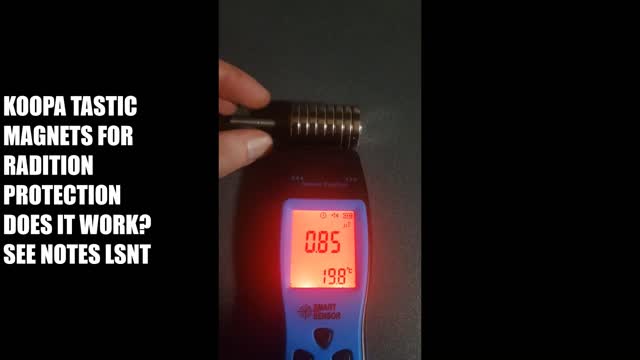Premium Only Content

EMF PROTECTION MY MAGNETS ARE NOT WORKING WHY?
SHORT VERSION EXAMPLE: if you were to grab one of the flat magnets on your refrigerator and try to see how well it blocked EMF radiation, you’d probably come out of the experiment disappointed. That’s because your regular refrigerator magnets can’t block EMF signals. Some of these cheap little magnets will do more to attract EMF to you than repel it. Since most refrigerator magnets are made cheaply and feature materials like rubber and plastic, they simply aren’t strong enough to prevent EMF radiation ---
LONG VERSION THE MAGNETS ARE NOT WORKING? I have an answer from the person who made the original video - Keep in mind that a “magnet” isn’t material in its own right. Instead, when referring to magnets, we mean anything that’s been magnetized.
Many different metals can be magnetized, like cobalt and iron. Most “magnets” that are used for blocking EMF radiation are actually magnetized metals of some sort.
Some elements are “ferromagnetic” when it comes to the earth’s metals, like a lodestone. Ferromagnetic means that these materials don’t totally keep the EMF radiation out; instead, they reduce the strength of the EMF radiation. That’s because as the EMF radiation passes through or nears the ferromagnetic element, it experiences a gradual loss of its force.
So, while it may be difficult for metals and magnets to block EMF radiation entirely, they can decrease the effectiveness of the EMF radiation.
To give you an example of how this works, think about how the walls that surround your room help to keep out sound, but cannot block it. That’s comparable to how ferromagnetic materials act on EMF radiation, reducing its potency without completely blocking out the EMF radiation.
Since not all magnets are necessarily capable of blocking or reducing EMF radiation, it’s essential to focus on the magnetized metals that do work well at this capacity, and how well they handle EMF radiation. For instance, a thick piece of iron alone can nearly block all parts of EMF radiation. We can magnetize the iron to make a magnet that blocks EMF radiation.
However, even if we magnetized the iron, nothing about the magnetization process would increase or decrease the iron’s ability to block the EMF radiation. Instead, the iron will continue to block EMF radiation, whether it’s a magnet or not.
For example, if you were to grab one of the flat magnets on your refrigerator and try to see how well it blocked EMF radiation, you’d probably come out of the experiment disappointed. That’s because your regular refrigerator magnets can’t block EMF signals. Some of these cheap little magnets will do more to attract EMF to you than repel it.
Since most refrigerator magnets are made cheaply and feature materials like rubber and plastic, they simply aren’t strong enough to prevent EMF radiation exposure. Refrigerator magnets are quite weak as far as magnets go. That’s because refrigerator magnets use: magnetized iron shavings AND OR rubber compounds CREDITS : KOOPA TASTIC / FREEDOM SOULJAH https://t.me/btfreedomsouljah
-
 5:13
5:13
LSNT
3 days agoSome Cannot Afford BUNKERS! But They Are Selling Up & Leaving...
2751 -
 UPCOMING
UPCOMING
Kimberly Guilfoyle
1 hour agoRussia Hoax Reality Check, Live! | Ep240
392 -
 LIVE
LIVE
vivafrei
2 hours agoWall Street Journal DOUBLING DOWN on Epstein! Lawyer in Canada DEBANKED! AND MORE!
13,019 watching -
 4:42:20
4:42:20
Donut Operator
4 hours agoI'M BACK/ CRIME/ GAMEBOY CAMERA CHAD
75.6K4 -
 9:51
9:51
Warren Smith - Secret Scholar Society
5 days agoThe Moment Tim Pool Discovered Why Andrew Wilson is so Unstoppable
11.3K18 -
 DVR
DVR
Film Threat
3 hours agoLIVE FROM SAN DIEGO COMIC-CON! (Thursday) | Film Threat Live
364 -
 1:40:00
1:40:00
The Quartering
2 hours agoEpstein Burnout, Hulk Hogan Dies, South Park Flops & Much More
94.9K19 -
 10:05
10:05
Michael Button
6 hours ago $0.10 earnedGroundbreaking Discovery at Stonehenge Rewrites History
2993 -
 LIVE
LIVE
RalliedLIVE
2 hours ago $2.48 earnedSPECIALIST ADDICTED MAN WINS WARZONE SOLOS
275 watching -
 1:11:41
1:11:41
Sean Unpaved
3 hours agoBat Flips to Boardrooms: Jets QB Crossroads, Presidential Visits, & RedZone's TV Takeover
35.5K